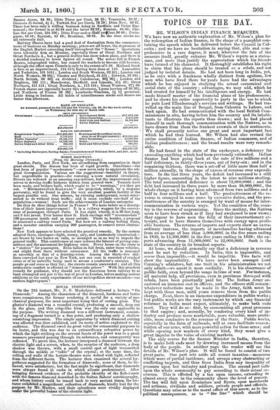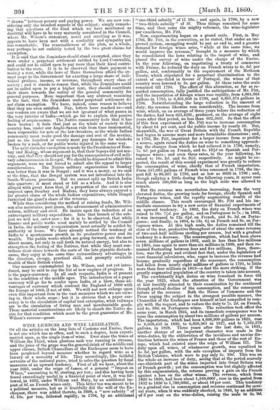TOPICS OF THE DAY.
MR. WILSON'S INDIAN FINANCE MEASURES.
WE have now an authentic explanation of Mr. Wilson's plan for the redemption of Indian finance, in the shape of a pamphlet con- taining the speech which he delivered before the Council in Cal- cutta ; and we have no hesitation in saying that, able and com- prehensive in a rare degree, it must, whatever the fate of the measure itself, greatly. enhance Mr. Wilson's repute as a states- man, and more than Justify the appreciation which his friends have formed of his character. It thoroughlf establishes his right to claim that his plans should be treated as a whole, and not judged by isolated details. He had not been long in India, yet, as he says with a frankness wholly distinct from egotism, few men who have lived there for years have had the advantages which he has enjoyed in studying the actual economical and social state of the country ; advantages, we may add, which ha had created for himself by his intelligence and energy. He had made himself master of the financial plans of his predecessors; and he shows his entire superiority to party in the use to which he puts Lord Ellenborough's services and writings. He had tra- velled up the main line of Bengal from Calcutta to Lahore and back again. He had communicated with the local BritishCom- missioners in situ, having before him the country and its inhabi- tants to illustrate the reports thus drawn ; and he had placed himself in such thorough communication with the Natives, as to have drawn from them the frankest avowals of their sentiments.
We shall presently notice one great and most important fact which he had thus learned. Mr. Wilson had also revised the entire condition of Indian finance, of Indian commerce, and of Indian productiveness ; and the broad results were very remark- able.
He had found in the state of the exchequer, a deficiency, far exceeding anything which had been previously estimated. Indian finance had been going back at the rate of five millions and a half deficiency, in thirty-three years, out of forty-six; and in the remaining thirteen, there was a set-off of little more than half a million annually, in the shape of excess of revenue over expendi- ture. In the last three years, the deficit had increased to a still higher figure, amounting in the latest to nine millions sterling. The total accumulated deficiency is about 72,000,0001.; and the debt had increased in three years by more than 38,000,0001., the whole charge on it having been advanced from two millions and a half to four millions and a half. The productiveness of the re- venue is cramped in some cases by excessive duties, and the pro- ductiveness of the country is cramped by want of means for inter- communication in various ways. Yet the condition of the corm- try is the reverse of unpromising. Since the mutiny, the Natives seem to have been struck as if they had awakened to new views; they appear to have seen the folly of their insurrectionary at- tempts, and to have thrown themselves with energy upon profit- able business. The returns of imports and exports show an extra- ordinary increase, the imports of merchandise having advanced from an average of less than 5,000,0001. in the five years ending in 1839, to 15,366,000/. in the five years ending in 18.59 ; the ex- ports advancing from 11,000,000/. to 22,000,000/. Such is the state of the country, in its broadest aspects. At home, we should generally say that a deficiency in revenue must be met by reduction. In India, this is impossible, and worse than impossible,—it would be impolitic. Two facts will show the impossibility. We have never been amongst Lord Canning's adulators, but one trait in his administration we not only admit—we assert it most cordially. It is his observance of public faith, even beyond the usage in time of war. For instance, all material help, all provisions, even in provinces thronged with rebels, have been punctually- paid for. The Indian Army oc- casioned an immense cost in officers, and the officers still remain: whatever reductions may be made in the Army, faith must be kept with those men, until years remove them from the public charge. Next, there is an immense expenditure in public works ; but public works are the very instrument by which any financial reformer in India must expect, ultimately, to make both ends meet. They will do so : first, by economizing all great processes in that empire ; and, secondly, by rendering every kind of in- dusty and produce more marketable, more valuable, more profit- able, more conducive to the revenue of the State. Public works, especially in the form of railroads, will at once facilitate concen- tration of our arms, with more powerful action for those arms ; and while opening new markets of every kind, they must -give a great impulse to the value of existing markets.
The only course for the finance Minister in India, therefore, is to make both ends meet by drawing increased means from the body of the people. In another page the reader will see the details of Mr. Wilson's plan. It will be found to consist of two great parts. One part sets aside all recent taxation—measures which were of partial incidence, and sweeps away obstructing or conflicting imposts, and thus frees India from any inequality of
pressure upon her industry and produce. The second part calls upon the whole community to pay according to their actual re- sources. This is effected by a tax upon income, extending to almost every class in the community above the level of penury. The tax wil fall upon Zemindars and Ryots, upon merchants and artisans, civilians and soldiers private people and officials. Questions may arise as to the moral 'effect of this screw, as to the political consequences, as to "the line" which should be
" drawn" between penury and paying power. We are now con- sidering only the broadest aspects of the subject ; simply remark- ing that questions of the kind which we have mentioned as doubtful will have to be very maturely considered in the Council, where Mr. Wilson's statement, novel and startling as it was, appears to have been met with a cordiality and sympathy not less remarkable. The reasonableness of the plan, as a whole, may perhaps be not unfairly tested by the two great claims for exemption.
It is said that the Zemindars should stand exempted, since they were under a perpetual settlement ratified by Lord Cornwallis, and could not be callet upon to pay more than their fixed contri- linden to the state. It is to be observed 'that their payment is mainly a rent, while the laws of Menu themselves afford the ut- most scope to the Government for exacting a large share of indi- vidual produce, income, or revenue, throughout every class of society ; and it stands to reason that, while the Zemindars could not be called upon to pay a higher rent, they should contribute their share towards the outlay of the general community for general purposes. More important than any abstract reasoning is the fact, that the Zemindars under perpetual settlement do not claim exemption. We have, indeed, some reason to believe that they are even satisfied. Nay, letters have reached us—and our readers are aware that we are not ignorant of what passes in the very interior of India—which go far to explain this passive feeling of acquiescence. The Native community feels that it has been beaten ; it feels that just as the whole of society in this country has, under our Anglo-Saxon rule from time immemorial, been responsible for acts of the law-breakers, so the whole Indian community must make good the damage and cost of the mutiny, just as the hundred or county must pay damages for windows broken by a mob, or for public works injured in the same way. The next claim for exemption is made by thePresidencies of Bom- bay and Madw, whose argument is, that their Sepoys did not mu- tiny, and that They should not pay for the consequences of evil mili- tary administration in Bengal. We should be disposed to admit this argument, were we not forced to admit also the appeal to larger considerations. The Native military organization in Bombay was better than it was in Bengal ; and it was a mercy, as we said at the time, that the Bengal system was not introduced into the South-Western province. But we cannot split up British India into quarters ; it must stand or fall as a whole. And it is also alleged with great force that, if a proportion of the costs is now imposed upon Bombay and Madras, they have always enjoyed a far greater share of the whole Indian expenditure, while Bengal furnished the giant's share of the revenue. While thus considering the method of raising funds, Mr. Wil- son also maintains, pan passu, the advancement of administrative reform, military and civil. He insists upon the reduction of an extravagant military expenditure. Into that branch of the sub- ject we will not enter now; for it is to be observed, that while finance and public works must mainly be settled by the Council in India, the military reorganization must actually be settled by authority at home. We have already noticed the tendency of India to a spontaneous growth in its productive power and its wealth. The public works which are going forward, are the most
direct means, not only to call forth its natural energy, but also to strengthen the feeling of the Natives, that while they must con- tribute their share towards the costs of the late gigantic disturb- ances, they enjoy at the same time extraordinary advantages in the direction, energy, practical skill, and promptly available wealth of their British rulers.
One measure contemplated by Mr. Wilson, and not yet intro- duced, may be said to cap the list of new engines of progress. It is the paper-currency. In all such respects, India is at present in the condition of the middle ages. The introduction of a paper -currency will go far to confer upon India, at a blow, those ad- vantages of currency- which contrast the England of 1860 with the Europe of 1060, if not of 660. We will not now enlarge upon even this important item in the vast measures which we are view- ing in their whole scope ; but it is obvious that a paper cur- rency is to the circulation of capital andenterprise, what railways are to the circulation of living men and merchantable goods. These material considerations are likely to clench the Native de- sire for that condition which must be the great guarantee of Mr. Wilson's success—peace.



























 Previous page
Previous page